Safety Symbol Index
Footwear Safety Symbols
 |
CSA White RectangleThe CSA White rectangle with orange Greek letter omega - Ω - indicates soles that provide resistance to electric shock. Such certified footwear contains a sole and heel design assembly that, at the point of manufacturing, has electrical insulating properties to withstand 18,000 Volts and a leakage current not exceeding 1mA for 60 seconds. |
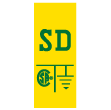 |
CSA Yellow RectangleThe CSA Yellow rectangle with a green “SD” and grounding symbol indicates soles are static-dissipative. The outer soles are made from an antistatic compound, capable of dissipating an electrostatic charge in a controlled manner. The test criteria are 106 to 108 Ohms. Note that SD footwear without toe protection will not have sole protection certified by CSA. |
 |
CSA Blue RectangleThe CSA Blue Rectangle indicates Grade 1 protective toe without sole puncture protection. Grade 1 toe withstands impacts up to 125 joules. |
 |
CSA Green TriangleThe CSA Green triangle patch indicates sole puncture protection with Grade 1 Protective toe to withstand impacts up to 125 joules. Sole puncture protection is designed to withstand a force of not less than 1200 Newtons (270 pounds). |
 |
Metatarsal ProtectionThe Metatarsal Protection symbol indicates protection for the metatarsal region of the foot when working around heavy objects. Toe protection is required for all metatarsal protective footwear. |
 |
Chainsaw ProtectionThe Chainsaw Protection symbol indicates footwear that provides protection when using chainsaws and other cutting equipment. |
 |
Super Static DissipativeThe CSA Yellow rectangle with a green “SD+” and grounding symbol indicates soles are static-dissipative. The outer soles are made from an antistatic compound, capable of dissipating an electrostatic charge in a controlled manner. When tested in accordance to ASTMF2412, each test specimen shall fall within a range of 106 Ohms - 3.5 x 107 Ohms. |
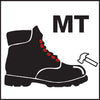 |
Metal or Steel Toe ProtectionMetal toe or steel toe safety shoes provide protection against impact and compression. |
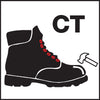 |
Composite Toe ProtectionSafety shoes with a composite toe are lighter weight and metal-free, while still providing all the protection of a steel toe. |
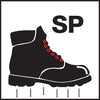 |
Steel Plate ProtectionSteel-plated safety shoes offer puncture resistance in the sole of the shoe. |
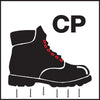 |
Composite Plate ProtectionComposite plate safety shoes offer lightweight, metal-free puncture resistance. |
Apparel Safety Symbols
|
ASTM F1506-10A
|
ASTM F1506-10A"Standard Performance Specification for Flame Resistant and Arc Rated Textile Materials for Wearing Apparel for Use by Electrical Workers Exposed to Momentary Electric Arc and Related Thermal Hazards” This specification provides performance requirements for clothing worn by electrical utility workers and other personnel working around energized parts. In addition to non-thermal requirements, the standard requires the fabric to be FR. Flame resistance here is measured using the ASTM D6413 Vertical Flame test (maximum of two seconds afterflame and 6-inch char length). The arc rating is either the arc thermal performance value (ATPV) or energy breakopen threshold (EBT) as measured by the ASTM F1959-06ae1 Arc Thermal Performance test. |
|
CLASS 1 LEVEL FR
|
CLASS 1 LEVEL FRCSA Z96-15 High-visibility safety apparel
Other general requirements include:
The Level designation is based on the minimum coefficient of retroreflection of the striping as designated in the standard. If the garment is designated as FR the Level is shown Level FR. |
|
ASTM F2302-08
|
ASTM F2302-08Standard Performance Specification for Labeling Protective Clothing as Heat and Flame Resistant. |
|
CSA Z96-09 Class 1
Level 2 |
CSA Z96-09 Class 1 Level 2Basic Harness or safety tape over the shoulders and encircling the waist. Suitable in less complex work areas where workers are seperated from car and truck traffic. |
|
CSA Z96-09 Class 2
Level 2 |
CSA Z96-09 Class 2 Level 2Full Coverage of the upper torso including front, back, sides and over the shoulders. The background material must be high visibility. For use in more complete or low-light work areas requiring greater visibility. |
|
CSA Z96-09 Class 3
Level 2 |
CSA Z96-09 Class 3 Level 2A class 2 garment combined with arm and leg bands. The background material must be high visibility to the standard. Hi-Viz coveralls meet this standard; safety jackets and pants can be worn combined, or arm/leg bands can be added to Class 2 garments, to attain Class 3. Suitable for use in complex work areas where low light, fast-moving traffic and inclement weather are safety factors. |
|
NFPA 70E
|
NFPA 70EThis standard provides guidance regarding the selection of personal protective equipment (PPE) for workers exposed to hazards associated with energized electrical equipment. |
|
CSA Z462-15
|
CSA Z462-15This standard provides guidance regarding the selection of personal protective equipment (PPE) for workers exposed to hazards associated with energized electrical equipment. Many of the clauses and tables contained in this standard are based on, and parallel, those in NFPA 70E. |
|
HRC 2
|
HRC 2A PPE Category listed in CSA Z462, to be used when using the PPE category method of identifying arc flash PPE needs. Arc-rated clothing, minimum arc rating of 8 cal/cm2:
Protective equipment: |
|
HRC 4
|
HRC 4A PPE Category listed in CSA Z462, to be used when using the PPE category method of identifying arc flash PPE needs. Arc-rated clothing, selected so that the system arc rating meets the required minimum arc rating of 40 cal/cm2:
Protective equipment:
Legend: AN = as needed (optional); AR = as required; SR = selection required |
|
NFPA 2112-2012
|
NFPA 2112-2012"Standard on Flame-Resistant Garments for Protection of Industrial Personnel Against Flash Fire" This standard specifies the minimum performance requirements and test methods for FR fabrics and components, and the design and certification requirements for clothing developed to protect workers from flash fire hazards. It requires FR fabrics to pass a comprehensive series of thermal tests, including the following:
|


